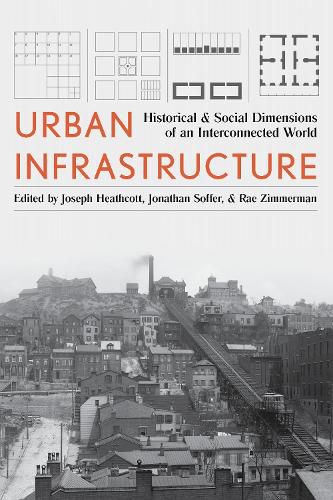Readings Newsletter
Become a Readings Member to make your shopping experience even easier.
Sign in or sign up for free!
You’re not far away from qualifying for FREE standard shipping within Australia
You’ve qualified for FREE standard shipping within Australia
The cart is loading…






Urban Infrastructures creates space for an encounter between historians, humanists, and social scientists who seek new methodological approaches to the history of urban infrastructure. It draws on recent work across history, anthropology, science and technology studies, geography, resilience/sustainability, and other disciplines to explore the social effects of infrastructure. The volume rejects narrow conceptions of infrastructure history as only the history of public works, and instead expands the definition to all business enterprises and public bodies that provide the goods and services essential for the day-to-day lives of most people. Essays examine traditional artifacts such as roads, highways, and waterworks, as well as nontraditional topics like regimes of heating and cooling, the processing and distribution of food, and even the metaphysics of electromagnetic infrastructure. Contributors reveal both the material grounding of urban social relations and the social life of material infrastructure. In the end, they show that infrastructure profoundly reshapes urban life even as residents fight to reshape infrastructure to their own ends.
$9.00 standard shipping within Australia
FREE standard shipping within Australia for orders over $100.00
Express & International shipping calculated at checkout
Urban Infrastructures creates space for an encounter between historians, humanists, and social scientists who seek new methodological approaches to the history of urban infrastructure. It draws on recent work across history, anthropology, science and technology studies, geography, resilience/sustainability, and other disciplines to explore the social effects of infrastructure. The volume rejects narrow conceptions of infrastructure history as only the history of public works, and instead expands the definition to all business enterprises and public bodies that provide the goods and services essential for the day-to-day lives of most people. Essays examine traditional artifacts such as roads, highways, and waterworks, as well as nontraditional topics like regimes of heating and cooling, the processing and distribution of food, and even the metaphysics of electromagnetic infrastructure. Contributors reveal both the material grounding of urban social relations and the social life of material infrastructure. In the end, they show that infrastructure profoundly reshapes urban life even as residents fight to reshape infrastructure to their own ends.